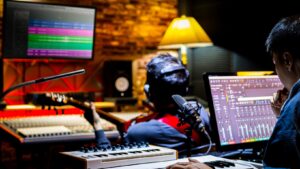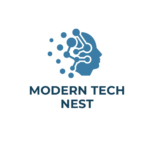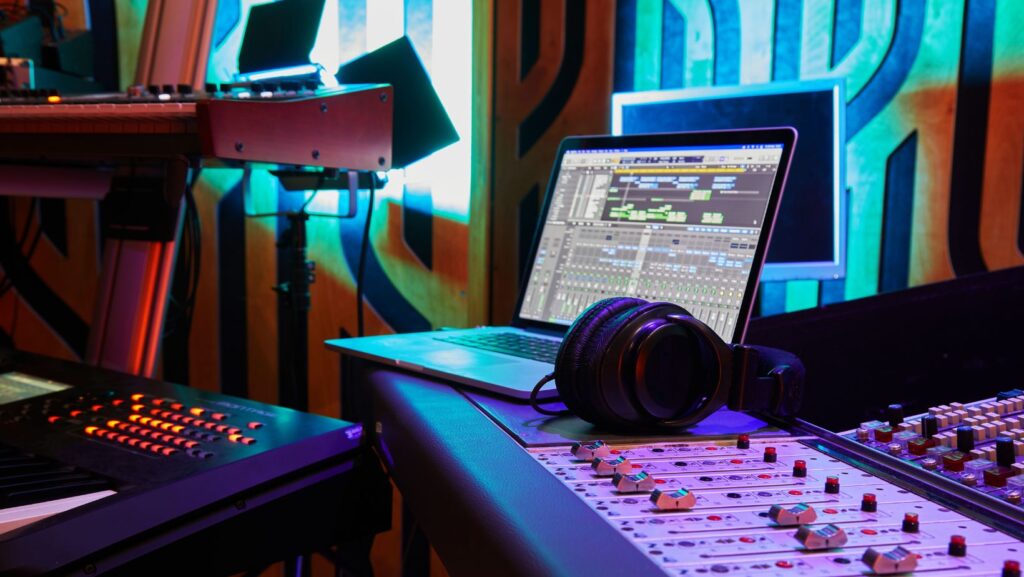Key Takeaways
- Growth in Demand: Music technology jobs are increasingly sought after as the music industry merges creativity with advanced technology.
- Diverse Career Paths: Key roles include audio engineer, sound designer, software developer, live sound technician, and music producer, each requiring specialized skills.
- Essential Skills: Success in this field demands technical proficiency, creativity, attention to detail, and strong problem-solving abilities.
- Emerging Trends: Innovations like AI, VR, AR, and blockchain are shaping the future of music technology, enhancing production processes and audience experiences.
- Industry Opportunities: The surge in streaming services, short-form content creation, and live events presents numerous job openings for skilled professionals in music technology.
In today’s fast-paced digital world, music technology jobs are on the rise, blending creativity with innovation. As the music industry evolves, professionals skilled in audio engineering, sound design, and software development find themselves in high demand. This intersection of art and technology opens up exciting career opportunities for those passionate about music and tech.
From designing cutting-edge music software to working in live sound production, the landscape is diverse and dynamic. Companies are seeking individuals who can push boundaries and create immersive experiences. Whether it’s developing apps that enhance music creation or managing sound for major events, the potential for growth in music technology careers is immense.
Music Technology Jobs
Music technology jobs encompass a variety of roles that merge creativity with innovation in the music industry. Their demand continues to increase as technology integrates further into music production and performance. Professionals in this field typically focus on audio engineering, sound design, and software development, among other specialties.
Key Career Opportunities
The following roles represent key career opportunities within music technology:
 Audio Engineer: Responsible for recording, mixing, and mastering sound for various mediums, including albums, films, and live performances.
Audio Engineer: Responsible for recording, mixing, and mastering sound for various mediums, including albums, films, and live performances.- Sound Designer: Creates original soundscapes and effects for media projects, including games, films, and theatrical productions.
- Software Developer: Designs and develops music-related software applications, such as digital audio workstations (DAWs) and plug-ins.
- Live Sound Technician: Manages the audio equipment during live performances, ensuring optimal sound quality for both artists and audiences.
- Music Producer: Oversees music recording projects, guiding artists through the creative process and making technical decisions regarding recordings.
Skills Required
Certain skills are essential for success in music technology jobs:
- Technical Proficiency: Mastery of audio equipment, software applications, and production techniques is crucial.
- Creativity: A strong sense of creativity fosters innovative solutions in sound design and music production.
- Attention to Detail: Precision in audio editing and mixing ensures high-quality sound output.
- Problem-Solving Skills: Ability to troubleshoot technical issues quickly during recording sessions or live performances.
Industry Landscape
The music technology landscape reflects the ongoing evolution of the industry. Companies actively seek professionals capable of developing immersive experiences through technology. The rise of streaming platforms and digital music distribution also drives demand for roles focused on technology integration and innovation.
With a blend of artistic talent and technical expertise, music technology jobs present numerous opportunities for career growth.
Types of Music Technology Jobs
Music technology encompasses various career paths, each requiring a unique blend of skills and expertise. Below are key categories of jobs within this dynamic field.
Live Sound Engineering
Live sound engineers manage audio during performances, ensuring optimal sound quality in real-time. They handle equipment setup, mixing, and troubleshooting issues. Skills include proficiency in equipment like mixing consoles and microphones, along with the ability to work under pressure during live events.
Studio Production Roles
Studio production roles focus on recording, mixing, and mastering music within a studio environment. Positions include music producers, sound engineers, and assistant engineers. Essential skills involve technical expertise in digital audio workstations (DAWs), knowledge of music theory, and effective collaboration with artists and musicians.
Music Software Development

Music software developers create applications and tools that enhance music creation, editing, and distribution. They design software for audio processing, composition, and sound synthesis. Required skills include programming knowledge in languages like C++ or Python and an understanding of sound engineering principles.
Acoustics and Audio Research
Positions in acoustics and audio research involve studying sound behavior and its applications in various environments. Roles include audio researchers and acousticians who work on optimizing sound quality in venues or products. Skills necessary for success include analytical thinking, knowledge in physics of sound, and experience with acoustic measurement tools.
Skills Required for Music Technology Jobs
Music technology jobs demand a unique set of skills that blend technical expertise with creative abilities. Professionals must be equipped to navigate both the artistic and technological aspects of the music industry.
Technical Skills
- Audio Engineering Proficiency: Understanding and operating recording equipment, microphones, and mixers enables effective sound capture and manipulation.
- Digital Audio Workstation (DAW) Expertise: Mastering software like Pro Tools, Ableton Live, or Logic Pro is crucial for music production and production workflows.
- Programming Knowledge: Familiarity with programming languages such as C++ or Max/MSP supports the development of custom audio applications and plugins.
- Sound Design Acumen: Creating and manipulating sound through synthesis and sampling techniques enhances the artistic contribution to projects.
- Acoustics Understanding: Knowledge of sound behavior and room acoustics optimizes audio quality in recording and performance spaces.
- Innovative Thinking: The ability to conceptualize original ideas and soundscapes fosters unique music creations and technological advancements.
- Attention to Detail: Focus on minute details improves the overall quality of recordings and compositions, ensuring professional and polished outputs.
- Problem-Solving Abilities: Quickly identifying and addressing technical issues in high-pressure environments is essential for maintaining workflow efficiency.
- Collaboration Skills: Effective communication and teamwork facilitate productive interactions with artists, producers, and other stakeholders.
- Adaptability: Embracing new technologies and trends allows professionals to stay relevant and enhance their creative processes in a fast-paced industry.
The Future of Music Technology Jobs
The landscape of music technology jobs continues to evolve, with emerging trends and increasing industry demand shaping the future. Professionals in this field must stay informed about new developments to maintain a competitive edge.
Emerging Trends
Emerging trends in music technology reflect advancements in digital tools and creative techniques.
- Artificial Intelligence: AI enhances music production, enabling automatic mixing, mastering, and personalized music recommendations.
- Virtual Reality (VR) and Augmented Reality (AR): VR and AR create immersive concert experiences, requiring skills in 3D audio and interactive sound design.
- Blockchain: Blockchain technology promotes transparency in music rights management and contracts, supporting fair compensation for artists.
- Remote Collaboration Tools: Tools for remote collaboration are essential, facilitating seamless interactions among musicians and producers across distances.
- Adaptive Learning: Adaptive learning platforms personalize music education, inspiring innovation in teaching methods and curriculum design.
Industry Demand
The demand for music technology professionals grows amidst rapidly changing consumer habits and digital innovations.
- Increasing Streaming Services: Streaming platforms generate a surge in job opportunities for audio engineers and sound designers who optimize sound quality.
- Short-Form Content Creation: The rise of platforms like TikTok elevates the need for music producers who can create catchy, succinct tracks.
- Live Event Technology: As live events return, there’s a heightened demand for skilled live sound technicians to enhance audience experiences.
- Software Development: The continuous growth of music production software calls for proficient developers in programming and sound design.
- Integration of AI: AI integration within music services increases the need for experts who can implement and refine these technologies effectively.
The future of music technology jobs remains promising, driven by continuous innovation and a commitment to enhancing the music experience through technology.
Blend of Technical Know-how And Artistic Vision
The landscape of music technology jobs is vibrant and evolving. As the industry embraces innovation and creativity, professionals equipped with the right skills will find ample opportunities. The blend of technical know-how and artistic vision is crucial for success in this dynamic field.
With emerging trends like artificial intelligence and immersive experiences shaping the future, those pursuing careers in music technology can expect a rewarding journey. The demand for skilled individuals will only grow as technology continues to redefine the music experience. Embracing this change could lead to exciting and fulfilling career paths in an industry that thrives on creativity and innovation.

